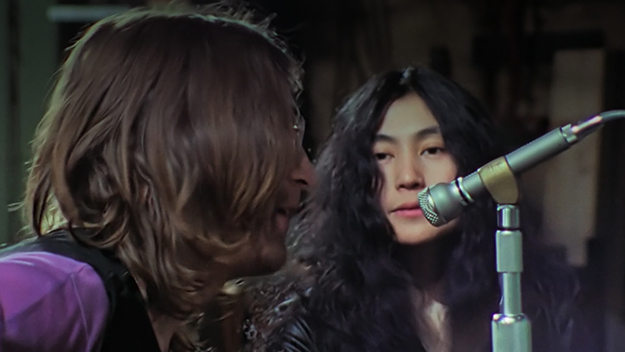An Image for 2022: Yoko Ono in Get Back
This article appeared in the January 6, 2022 edition of The Film Comment Letter, our free weekly newsletter featuring original film criticism and writing. Sign up for the Letter here.

The Beatles: Get Back (Peter Jackson, 2021)
Peter Jackson’s epic Beatles doc Get Back, like all good durational art, tries one’s patience before ultimately coaxing the viewer into its internal rhythm: in this case, the herky-jerk works and days of the Fab Four as they struggle to overcome egos and exhaustion and create art. It’s both shocking and moving (though it shouldn’t be) to see these pop-culture demi-gods revealed to be just like any other group of sweaty young men in tight quarters. If Frederick Wiseman ever makes a movie about a particularly sensitive fraternity, it might resemble Get Back.
Of course, there is also a woman in the room—a nearly silent observer—throughout the entirety of the series. Yoko Ono’s abiding presence—knitting, reading, smoking, eating—has been discussed as an extension of her art practice. As I watched I began to see Yoko—who worked and palled around with the likes of John Cage, Jonas Mekas, La Monte Young, Yvonne Rainer, and Tony Conrad—as a portal to a parallel world: the world of the avant-garde, casually shadowing, driving, and inspiring the popular arts typified by the Beatles. Just two months after the Get Back footage was shot, Yoko and John recorded the still face-melting “Cambridge 1969,” a coruscating squall of feedback and freeform wailing that offers a counterpoint to the perfectly wrought songcraft of “Let It Be.” Yoko’s presence in Get Back, and her bemused half-smile, is a reminder of the persistence and influence of the avant-garde even in the most commercial spaces. Long may Yoko’s specter of the underground haunt the mainstream (and vice versa).







